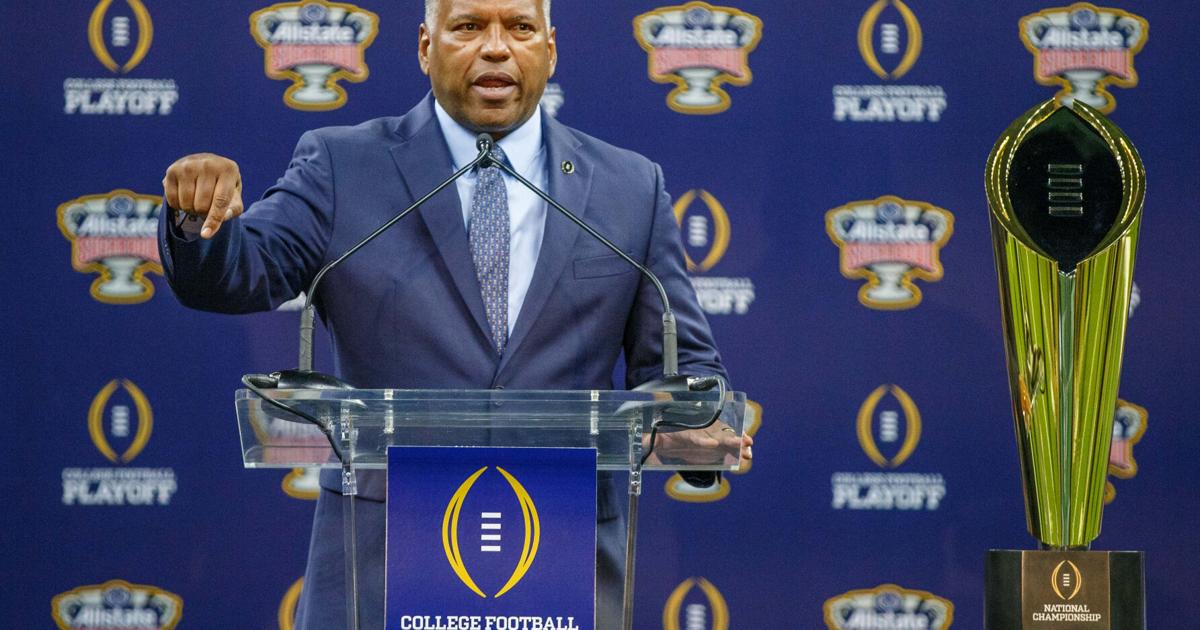
Finally.
Some positive news on the local football front.
The College Football Playoff championship game is returning to New Orleans.
Officials announced Wednesday that the Caesars Superdome will play host to the CFP title game for the 2027 season on Jan. 24, 2028.
The announcement was welcome news to local football fans who have suffered through an 0-4 start to the Saints season and back-to-back recent losses by Tulane and LSU to Ole Miss.
The 2028 game will enhance New Orleans’ long, proud history of hosting college football title games. It will be the first time New Orleans has hosted the game since the CFP expanded to a 12-team tournament format in 2024, but it hosted the CFP title game after the 2019 season and the BCS national title game every four years between 1999 and 2011.
The national champion was crowned here numerous other times in de facto title games when the top-ranked team played in the Sugar Bowl.
“Everything about New Orleans makes this the perfect destination for a big event,” said Rich Clark, the executive director of the College Football Playoff. “It’s a destination city. It has great accessibility. People can walk everywhere. The food. The hospitality. People want to come here. … And we’re excited to bring our game here and have that opportunity to raise our championship to the next level.”
New Orleans has been a college football hotbed since the Sugar Bowl started in 1935. The Sugar Bowl, along with the other “Big Six” bowls in Atlanta (Peach), Dallas (Cotton), Los Angeles (Rose), Miami (Orange) and Phoenix (Fiesta), has been a mainstay in the rotation for national championship games. Since 1934, no other bowl has hosted as many national championship teams as the Sugar Bowl’s 29.
Since college football officials created a title game in 1998, New Orleans has hosted five championship games. The 2028 game will be the sixth. When and if we land a seventh one, remains to be seen.
The competition to host the game is more than intense than ever. In addition to the other Big Six markets, non-traditional markets like Indianapolis, Houston, Las Vegas, Nashville and Tampa have elbowed their way into the mix. As the demand has increased, so has the asking price from the CFP.
If New Orleans wants to stay in the game, city, state and corporate leaders will have work hand in hand to make it happen.
That’s why Sugar Bowl CEO Jeff Hundley spent several minutes Wednesday making an impassioned pitch to the local and regional business community for support. The price tag to stage the event has doubled from the $13 million required in 2020, Hundley said. With the state of Louisiana only contributing $500,000 from the major event fund to help lure the 2028 game, the Sugar Bowl had to invest $6 million from its reserve fund to make the event go. They invested a similar amount in 2020.
In the 12 years of the playoff, no other bowl organization in the country has used so much of its own money to land the game, Hundley said.
“The fact of the matter is, the dollars and cents just mean way more than they ever have in the history of the game,” Hundley said. “If the funds are there, we’ll have a long and strong role in the future of college football. And if they aren’t, we won’t. … We don’t want to become an ‘also-ran’ bowl with 30,000 fans here.”
The reality is major college football has become big business. The advent of revenue sharing with college athletes and Name, Image and Likeness (NIL) policy has generated a greater demand for resources than ever. Every level of the college football food chain is stressed, including the bowl system.
New Orleans can no longer rely solely on its intrinsic charm and time-honored reputation as a big-event town to lure future CFP title games. The Superdome and French Quarter are great and everyone loves them, but they only go so far in the grand scheme of things. The state and business community will need to step up if New Orleans wants to remain a player in the college football title game business.
There’s an argument to be made about how much support is enough. But state officials should be embarrassed that only $500,000 is being contributed to the CFP title game from the major event fund, especially in comparison to the $7 million and $3.5 million contributions made to the help land the LIV Golf tournament event in New Orleans next June and the 2025 U.S. Bowling Congress (USBC) Open Championships in Baton Rouge this summer, respectively.
Officials say the 2020 CFP title game and Sugar Bowl combined to produce a $500 million economic impact for the region, including $50 million in direct tax revenue.
Economists might argue that number, but there’s an obvious prestige factor and economic benefit to hosting the game. Otherwise, there wouldn’t be so much competition from other cities to host them. Las Vegas reportedly anted up to $40 million to host the 2027 CFP title game.
“We’ve always fought above our weight class, and we will always have to fight above our weight class if we want to stay there,” Hundley said.
New Orleans has a decision to make. Do we want to be a championship city? Or an also-ran to Atlanta, Nashville and Las Vegas?



